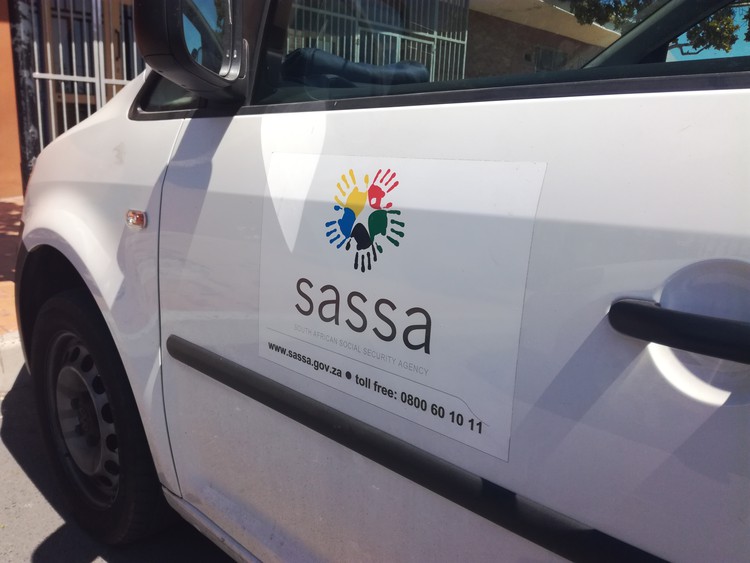SASSA says Grindrod bank charge is “disingenuous”
SASSA card users will be charged R10 a month plus ATM withdrawal charges

Dianne Dunkerley, executive manager of grants administration at the South African Social Security Agency (SASSA), told GroundUp that Grindrod Bank was being “disingenuous” when it stated that it was “forced to charge grant beneficiaries bank charges due to SASSA withdrawing their subsidy”.
On 23 March, the Constitutional Court granted Cash Paymaster Services (CPS) a six-month extension on its contract with SASSA to continue doing cash payments until September.
“Grindrod Bank are forced to charge grant beneficiaries bank charges due to SASSA withdrawing their subsidy,” said Grindrod Bank in a media release on 28 March.
Who is affected by the new charge?
It’s easier to answer this question by first saying who isn’t affected. Grant recipients who collect their payments in cash from SASSA paypoints are not affected. Recipients whose grants are paid directly into their commercial bank accounts are also not affected.
But recipients who collect their money using their SASSA cards via ATMs or third parties such as Pick ‘n Pay, will be charged the R10. These recipients are in effect holders of Grindrod bank accounts (although they may never deal directly with the account).
According to the statement, SASSA card users will have to pay a monthly fixed fee of R10 as well as ATM cash withdrawal charges.
Dunkerley said this is “disingenuous”. She explained that SASSA’s contract with CPS allowed beneficiaries to be paid at cash points and through ATMs, for which SASSA paid a transaction fee of R16.44 per beneficiary “to CPS to help soften the bank charges”.
But because the Constitutional Court ruling only allows for CPS to continue making payments at cash points, beneficiaries who collect their grants at ATMs or stores would have to pick up the charges. “Banks can charge their clients whatever fee they like,” said Dunkerley.
Dunkerley was quick to add that this is an interim arrangement until new SASSA cards become available. “The new SASSA cards will be available from 16 April, in limited number, but certainly at the end of April,” said Dunkerley.
Support independent journalism
Donate using Payfast

Don't miss out on the latest news
We respect your privacy, and promise we won't spam you.
Next: Education department blames Grootkraal community for delays
Previous: Community lives in fear of giant rock
Letters
Dear Editor
“Banks can charge whatever fee they like.” That’s the problem, isn't it?
A decade ago the Competition Commission’s investigation into bank charges was dropped after banks reportedly pressurised incoming finance minister Pravin Gordan, who had also expressed concern, to drop it. He allowed them to “self-regulate”. Instead, South Africans saw a significant increase in fees. Gordan, putative “hero at the bridge”.
South African banks derive a large portion of their total revenue from fees and charges – over R50 billion annually. According to the IMF’s David Lipton (2016), local bank fees are high. This accounts for their and other SA companies “enjoying high profit margins, often 50 percent higher than in other countries, built upon barriers that hurt consumers and block potential competitors”. High fees and high profits hurt consumers and enterprises, and ultimately, contribute to SA's low-growth, high-unemployment economy.
The government, allegedly the government for the people, intervenes in all areas, even areas it shouldn’t like the sugar tax, but allows banks free rein. I wonder why.
This week I laid a complaint against my credit card company with the National Consumer Commission for unilaterally bundling “value-added services” I don’t want or need for a monthly fee they automatically deduct. These services, which benefit them and partner organisations, are unrelated to the credit card facility – they’re not the reason I obtained the card and it’s not mentioned in my contract. This violates consumers’ constitutional economic rights and Consumer Protection Act that outlaws bundled services if consumers don’t want it.
The company’s initial response last month was inane and value-less. When I notified them that I complained to the NCC, again, rather than respond to statutory provisions about customer rights and choice, they cut-and-paste from bank policy, which they assert is legal.
I’m not waiting if and when the NCC gets to my complaint. But on principle I told the company I don’t accept it, and am looking into closing my account.
© 2018 GroundUp. 
This article is licensed under a Creative Commons Attribution-NoDerivatives 4.0 International License.
You may republish this article, so long as you credit the authors and GroundUp, and do not change the text. Please include a link back to the original article.
